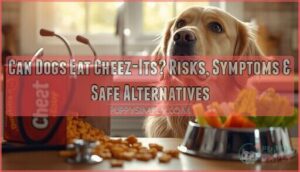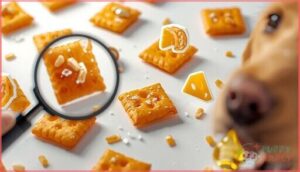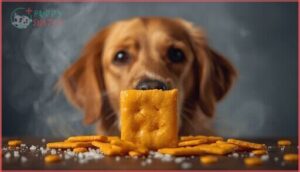This site is supported by our readers. We may earn a commission, at no cost to you, if you purchase through links.
That crunchy, cheesy snack you’re munching might look harmless enough, but when your dog’s pleading eyes meet yours, you’re facing a question that matters more than you’d think. Can dogs eat Cheez-Its? The short answer is no. These popular crackers pack a dangerous trio of excessive sodium, unhealthy fats, and questionable additives that can trigger everything from dehydration to pancreatitis in your canine companion.
A single serving contains nearly 250 milligrams of sodium, which is already pushing the daily limit for most dogs, and the concentrated cheese flavoring introduces dairy that many dogs simply can’t digest properly.
Understanding what makes these crackers risky, recognizing the warning signs if your pup sneaks a few, and knowing which alternatives won’t compromise their health can help you make confident decisions when those puppy eyes start working overtime.
Table Of Contents
Key Takeaways
- Cheez-Its pose serious health risks to dogs due to excessive sodium (nearly 250mg per serving), unhealthy fats that can trigger pancreatitis, and dairy ingredients that many dogs can’t properly digest.
- While one or two crackers won’t cause emergency-level toxicity, watch for warning signs like vomiting, diarrhea, excessive thirst, muscle twitching, or seizures—symptoms that require immediate veterinary attention if they persist or worsen.
- Safe alternatives include single-ingredient dog treats, plain cooked chicken or turkey, vegetables like carrots and green beans, or homemade snacks using oat flour and unsalted peanut butter.
- Prevention centers on secure storage in high cabinets or sealed containers, training your dog with the “Leave It” command, and establishing consistent snack-time boundaries that all household members enforce.
Can Dogs Eat Cheez-Its?
Your dog’s pleading eyes during snack time can be hard to resist, but Cheez-Its aren’t safe for canine consumption. While a single cracker won’t likely cause emergency-level food toxicity, these popular snacks carry real canine health risks that every pet owner should understand.
The same concerns apply to Goldfish crackers and similar cheese-flavored snacks, which contain ingredients that can upset your dog’s digestive system.
The high sodium content, excessive fat, and questionable additives make Cheez-Its a poor choice for your dog’s diet, regardless of how much they beg. Dog nutrition facts clearly show that these crackers offer zero benefits and multiple hazards, so veterinary guidance consistently recommends avoiding them entirely and choosing proper snack alternatives instead.
Owners should be aware of the pancreatitis risk in dogs associated with high-fat snacks like Cheez-Its.
What Ingredients Are in Cheez-Its?
Before you decide whether to share your Cheez-Its with your dog, you need to know what’s actually in them. These crackers contain a mix of processed ingredients that aren’t designed with canine health in mind, and some of them can pose real problems for your pet.
Let’s break down the main components, nutritional content, and potential allergens you should be aware of.
Main Components (Flour, Cheese, Oils, Salt)
Cheezits rely on enriched flour to create their crispy structure, with wheat providing the gluten network that holds everything together during baking. Vegetable oil blends coat each cracker, adding fat and crunch, while salt amplifies taste.
The cheese component, made from skim milk and whey protein, delivers that sharp cheddar flavor your pup finds irresistible.
However, these ingredients spell trouble for dog health and pet nutrition.
Nutritional Breakdown (Calories, Fat, Sodium)
Each 29-gram serving of Cheez-Its packs about 160 calories, with 7 to 9 grams of fat and roughly 170 to 190 milligrams of sodium. These numbers might seem manageable for you, but they create serious dietary risks for your dog’s canine diet.
The calorie intake from just a handful disrupts nutrient balance, while excessive fat and sodium threaten dog nutrition far more than you’d expect.
Additives and Allergens
Beyond the basic macronutrients, Cheez-Its contain food dyes like Yellow 5 and Yellow 6, which can trigger food allergies or digestive upset in sensitive dogs. You’ll also find lactose from cheese flavoring, gluten allergens from wheat-based crackers, and potential sulfite sensitivity risks from preservatives.
Nut cross-contamination during manufacturing adds another layer of concern for canine health, making these toxic ingredients particularly dangerous for dog nutrition.
Why Are Cheez-Its Harmful to Dogs?
Those ingredients might seem harmless on a nutrition label, but dogs process salt, fat, and certain additives very differently than we do. What’s just a salty snack for you can trigger serious health problems in your dog, from digestive upset to life-threatening conditions.
Before offering any new food, check guides like can dogs eat turkey neck to understand which options are safe and which could pose hidden risks.
Let’s break down exactly why Cheez-Its don’t belong in your pup’s diet.
Salt Poisoning and Symptoms
High sodium levels trigger hypernatremia in your dog’s bloodstream, pulling water from cells and causing severe dehydration. Watch for intense thirst, vomiting, diarrhea, and lethargy within hours of sodium overload.
As salt intoxication worsens, muscle twitching, confusion, and seizures can develop from electrolyte imbalance. This isn’t just an upset stomach—salt poisoning threatens canine health and requires immediate veterinary attention.
Salt poisoning in dogs can escalate from muscle twitching and confusion to seizures, demanding immediate veterinary care
Pet owners should be aware of the dangers associated with salt poisoning symptoms and act quickly if any are observed.
Fat Content and Pancreatitis Risk
Your dog’s pancreas struggles with fatty snacks like Cheez-Its, which pack 6 to 7 grams of fat per serving. This fat intake overwhelms the organ, triggering inflammation that leads to pancreatitis—a painful condition marked by vomiting, abdominal pain, and lethargy.
Fatty acid effects hit obese or sensitive dogs harder, turning a simple treat into a digestive crisis requiring urgent veterinary care.
Allergy and Digestive Concerns
Sensitivity to dairy, wheat, or soy in Cheez-Its can spark allergic reactions and digestive issues in your dog, ranging from mild gas to severe vomiting and diarrhea. Food allergies in dogs often target the gut, where immune responses disrupt canine nutrition and gut health.
- Dairy triggers bloating, cramps, or loose stools in lactose-intolerant dogs
- Wheat sensitivity causes intestinal irritation, vomiting, or mucus-filled diarrhea
- Soy may provoke stomach upset or skin reactions in allergic dogs
- High sodium worsens dehydration during allergy-related digestive distress
Obesity and Long-Term Health Issues
Frequent snacking on Cheez-Its loads your dog with excess calories and fat, paving a direct path to obesity and the chronic diseases that follow. Weight management becomes critical when high-calorie treats displace balanced pet nutrition, raising risks for canine diabetes, joint strain, and heart disease.
Obesity prevention starts with healthy snacking choices that support long-term dog health, wellness, and vitality rather than undermining canine nutrition and pet safety.
What Should You Do if Your Dog Eats Cheez-Its?
If your dog snatches a few Cheez-Its off the counter, don’t panic—a small amount probably won’t cause serious harm, but you’ll need to watch for certain warning signs. The key is knowing what symptoms require immediate attention versus what you can monitor at home.
Let’s walk through the signs to watch for, when you should call your vet, and simple steps to prevent this from happening again.
Signs of Illness to Watch For
After your dog snags a few Cheez-Its, keep a close eye out for warning signals. Vomiting causes immediate concern, especially if accompanied by diarrhea lasting beyond 24 hours—both point to digestive issues from salt poisoning or pancreatitis.
Watch for dehydration signs like dry gums and lethargy, abdominal pain shown through whining, or neurological symptoms such as tremors, all indicating dog health risks requiring veterinary care.
When to Seek Veterinary Care
When your dog can’t keep water down for 12 hours or shows persistent vomiting, contact your veterinarian immediately for urgent care. Emergency signs like seizures, repeated collapse, or difficulty breathing demand instant veterinary guidance.
Call poison control if you suspect salt poisoning, and always seek veterinary advice when symptom monitoring reveals worsening conditions—protecting pet safety means acting fast on dog health risks.
Home Safety Tips to Prevent Accidental Eating
Beyond recognizing symptoms, accident prevention starts with secure storage and kitchen barriers that keep Cheez-Its out of paw’s reach:
- Place snack boxes in high cabinets or locked pantries to prevent counter surfing and unauthorized access to toxic substances.
- Install baby gates or close doors during meal prep, creating effective kitchen barriers for snack safety.
- Store open packages in rigid, tight-lid containers that block smells and discourage food-seeking behavior.
- Clear counters immediately after snacking, removing crumbs and boxes that tempt your dog.
Are There Any Safe Alternatives to Cheez-Its for Dogs?
Yes, there are plenty of safe alternatives that satisfy your dog’s craving for something crunchy and tasty without the health risks that come with Cheez-Its. You can choose from specially formulated dog treats, certain human foods that are actually dog-safe, or even make your own snacks at home.
Let’s look at some options that won’t put your pup’s health at risk.
Healthy Store-Bought Dog Treats
Choosing the right treats doesn’t have to feel overwhelming when you know what to look for. Start with single-ingredient or limited-ingredient options that meet pet food regulations and prioritize natural ingredients. Organic treats often skip artificial colors and preservatives, giving you healthy snack options that align with solid dog nutrition facts and pet nutrition advice.
Here’s what matters most when you’re selecting snack safety champions for your pup:
| Quality Factor | What to Look For |
|---|---|
| Ingredient List | Single or minimal components (meat, water) with no by-products or fillers like corn syrup |
| Sodium Content | Low sodium or no added salt labels; 5-20% of daily allowance per serving |
| Allergen Control | Grain-free options with potatoes or peas if wheat, soy, or dairy trigger sensitivities |
| Brand Transparency | AAFCO statements, published sourcing info, and third-party testing documentation |
| Texture & Size | Small, bite-sized pieces for training; mix of crunchy and soft for dental health and senior dogs |
Read the Guaranteed Analysis to compare sodium across brands, because portion control keeps daily intake within safe limits and reduces dog health risks. Look for United States or Canada sourced ingredients, and verify there are no artificial dyes that can irritate sensitive dogs. Brands that publish complete ingredient sourcing and manufacturing details earn your trust, so don’t settle for vague labels when your dog’s health is on the line.
Safe Human Foods as Dog Snacks
You don’t need packaged dog treats to reward your pup safely. Plain cooked chicken or turkey without seasoning, carrot sticks, green beans, apple slices without seeds, and blueberries all satisfy canine dietary needs while supporting healthy snacking for dogs.
Tiny portions of plain yogurt or cheese work too if your dog tolerates dairy, giving you human food alternatives that align with pet food safety and dog nutrition facts without the risks Cheez-Its bring.
Homemade Dog-Friendly Treat Ideas
Making your own treats lets you control exactly what your dog consumes while meeting canine dietary needs. Combine oat flour with unsalted peanut butter for simple homemade biscuits, or blend pumpkin puree with egg to create soft, healthy snacks using natural ingredients.
- Mix banana and cottage cheese for protein-packed dog friendly recipes
- Bake sweet potato with coconut flour for grain-free training bites
- Freeze carrot and apple puree into cooling summer treats
How Can You Prevent Dogs From Eating Cheez-Its?
Prevention is always easier than treatment, especially regarding curious dogs and salty snacks. The good news is you don’t need to follow your dog around 24/7 to keep them safe from Cheez-Its and similar foods.
A few simple strategies around storage, training, and managing mealtime habits can make all the difference in keeping those orange crackers out of your dog’s mouth.
Storage and Supervision Tips
The best defense starts with secure storage—keep Cheez-Its in sealed containers on high shelves or behind childproof latches, out of your dog’s reach. Pet proofing your pantry prevents counter surfing and accidental access.
During snack time, supervise closely and never leave opened bags unattended. Teaching “leave it” helps reinforce boundaries, while clearing dropped pieces immediately protects your dog from temptation and potential harm.
Training Dogs to Avoid Human Snacks
Teaching your dog the “Leave It” cue forms the cornerstone of effective snack avoidance and canine discipline. Start with low-value distractions in a closed fist, rewarding only when your dog looks away and holds eye contact. Gradually increase difficulty with tempting human food at varying distances, using consistent dog training sessions and high-value dog treats as reward systems to reinforce proper dog etiquette around snacks.
Key Training Steps:
- Begin Leave It training with closed-fist method, rewarding eye contact before releasing treats
- Practice in multiple rooms to generalize the cue and prevent slippage
- Gradually decrease distance from tempting snacks as your dog succeeds
- Keep sessions short (5–10 minutes daily) to maintain focus and motivation
- Use calm, neutral voice when giving commands to avoid mixed signals
Progressive challenge training helps dogs resist even the most tempting human food. Add background distractions like TV or conversation to simulate real-life scenarios, and document progress to stay consistent. If your dog struggles despite training, consult with veterinary care professionals for additional behavior guidance.
Managing Begging and Snack Time Behaviors
Consistent snack time rules lay the groundwork for begging prevention and canine self-control. When you establish firm boundaries and stick to a fixed routine, your dog learns that human snacks aren’t part of their healthy reward systems. Combine environmental controls with positive dog training tips to manage behaviors effectively.
| Strategy | Action Steps | Expected Outcome |
|---|---|---|
| Fixed Meal Schedule | Set designated feeding times with scheduled dog treats | Reduced random begging during family snack time |
| Designated Feeding Zone | Create a separate area away from human dining spaces | Clear boundaries between human snacks and dog food |
| Redirect Attention | Offer puzzle feeders or enrichment toys during your snack times | Mental stimulation replaces food-focused begging |
| Reward Quiet Behavior | Praise and treat your dog only after they remain calm near food | Reinforced healthy snacking habits for dogs |
Involve all household members in your snack time rules so everyone responds the same way to begging behavior. Pet owner responsibilities include maintaining consistency for at least three weeks, tracking progress weekly, and adjusting dog training methods as needed to solidify long-term canine self-control.
Frequently Asked Questions (FAQs)
How many Cheez-Its can a dog eat?
A curious beagle once snagged an entire box from the counter, later showing signs of distress. While one or two Cheez-Its won’t poison your dog, you shouldn’t offer them intentionally due to harmful sodium levels.
Are dogs allowed to Cheez-Its?
Dogs aren’t technically forbidden from eating Cheez-Its, but these snacks pose serious canine health risks due to toxic ingredients like excessive salt, high fat content, and potential allergens requiring veterinary care if consumed in larger amounts.
Can dogs have cheese crackers?
Crunchy cheese crackers can cause concern for canine companions. Most varieties contain concentrated salt, fats, and additives that threaten dog nutrition facts and pet food safety.
So, canine snack options should emphasize healthy treat ideas over risky human foods.
Will one cheeto hurt a dog?
A single Cheeto likely won’t cause serious harm, but the high salt and fat content can trigger mild stomach upset, excessive thirst, or nausea—especially in small breeds or dogs with sensitive digestion.
Can dogs eat Cheez-its?
No, your dog shouldn’t eat Cheez-Its. These crackers contain excessive salt and fat that pose serious canine health risks, including salt poisoning and pancreatitis, making them unsafe snacks despite their appeal.
Can eating cheese cause dizziness?
Yes, cheese can cause dizziness in people with lactose intolerance, dairy sensitivity, or tyramine sensitivity. High salt content may also trigger blood pressure spikes, while fatty cheeses can slow digestion, creating lightheadedness in susceptible individuals.
Can dogs eat Cheez It Cracker?
While technically not toxic in tiny amounts, Cheez-Its pose serious canine health risks due to high sodium (1 grams per cracker), fat content, and toxic ingredients that trigger salt poisoning, pancreatitis, and digestive upset—making them unsafe snacks for your dog.
Can dogs eat cheese?
Most dogs tolerate small amounts of cheese as snacks, but lactose intolerance, dairy sensitivity, and cheese allergies can trigger digestive upset.
Consult your veterinarian about canine nutrition and safe portions for your dog’s digestion.
What happens if my dog eats a Cheez-It?
A single Cheez-It likely won’t cause serious harm, but watch for mild stomach upset, increased thirst, or digestive upset—especially if your dog has lactose intolerance.
Multiple crackers raise concerns for salt poisoning.
Can dogs have crackers cheese?
While plain crackers and small cheese cubes can be occasional dog treats, watch for dairy intolerance and high sodium.
CheezIts combine both risks, making dedicated canine diet snacks safer for your pet’s wellness.
Conclusion
Regarding whether dogs can eat Cheez-Its, think of these crackers as nutritional landmines—tempting on the surface but potentially explosive for your dog’s health.
The sodium overload, unhealthy fats, and dairy content aren’t worth the risk, especially when safer alternatives exist.
Keep those orange squares out of reach, stay alert for symptoms if your pup sneaks a snack, and choose treats designed specifically for canine bodies. Your dog’s wellbeing depends on these boundaries.
- https://www.petmd.com/dog/nutrition/can-dogs-eat-onions
- https://pangovet.com/talk-to-a-vet-online-dog-ate-drank-something/?utm_source=dogster&utm_medium=article&utm_campaign=dog_eat_drink&utm_content=can-dogs-eat-cheez-its
- https://www.petplan.co.uk/pet-information/puppy/advice/four-homemade-puppy-treats/
- https://www.dogster.com/dog-nutrition/can-dogs-eat-cheez-its
- https://articles.hepper.com/can-dogs-eat-cheez-its/















